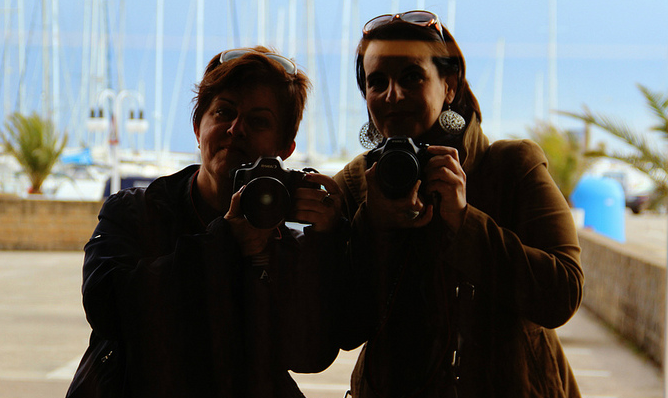Is Your Obsession With Selfies Leading To An Infestation Of Lice?

We’re pretty sure these lovely ladies do not have lice, but they take a great selfie.
(Felicia Violi PHOTOGRAPHY)
Selfies are all the rage. The word was added to the dictionary last year for crying out loud. Children, teens and even some misguided adults have jumped on the selfie bandwagon. But cozying up to your friends, or maybe even strangers, for a selfie could be bad for your health and your hair.
Lice-treatment experts are now saying the surge in selfies has led to an infestation of head lice, CNET reports.
The number of lice cases has increased significantly and it’s all because of selfies, says Mary McQuillan, a lice-treatment expert in California.
“Head lice are spread through head-to-head contact. Lice don’t jump or fly, so you actually have to touch heads,” McQuillan, operator of two lice salons, said in a press release. “Every teen I’ve treated, I ask about selfies, and they admit that they are taking them every day.”
Another lice-treatment expert says she found some merit to McQuillan’s claim.
Vanessa Mor, a supervisor at a lice-treatment facility in Oakland, Calif., tells CNET the claim does have some value since direct contact is made while taking a selfie.
She also reported seeing an uptick in the number teens and young adults with lice, but she did not attribute the problem directly to photo fad.
Dermatology resident Nick Celano says the amount of time required to take a selfie generally isn’t long enough for transmission.
“The way we’re taught is that it takes contact for an extended period of time, and 10 seconds is not what I’d consider an extended period of time. We’re in rooms with patients that have lice, and we don’t really worry about getting it transmitted from one person to the other while in the room,” he tells CNET.
Other pest experts say the new claim is simply a way to drum-up business.
“This is a marketing ploy, pure and simple,” Dr. Richard J. Pollack, a teacher at the Harvard School of Public Health and operator of a pest identification business, says. “Wherever these louse salons open a new branch, there always seems to be an epidemic. It’s good for business.”
The Centers for Disease Control and Prevention estimate there are 6 million to 12 million lice infestation cases each year. The most common way lice is spread is through sharing of combs, hats, and bedding.
Whether or not there’s a connection between the time-honored tradition of leaning in for selfies with your friends and the spread of lice, we don’t know. But we just might be hanging up our selfie superstar badge, you know, just in case.
Are selfless causing the spread of head lice? [CRNET]
Want more consumer news? Visit our parent organization, Consumer Reports, for the latest on scams, recalls, and other consumer issues.

